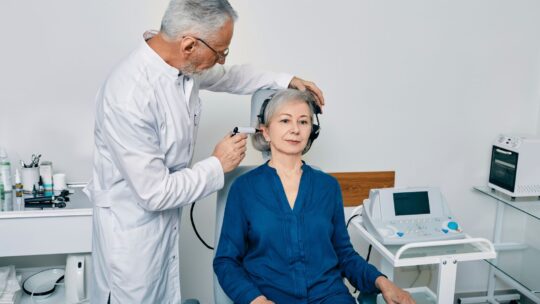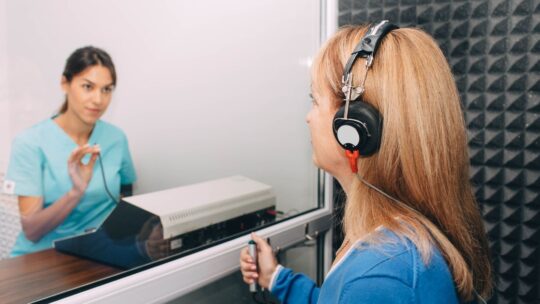
Hearing is something many of us often take for granted. We immerse ourselves in conversations, enjoy music, and appreciate the subtle sounds of nature. However, as we age, our hearing acuity can decline without us even noticing. It’s a gradual process, often so subtle that people may not realise the extent to which they’ve lost their hearing until it starts impacting daily life. For those in their 30s and beyond, periodic hearing assessments can be invaluable.
Often, the question arises: when was the last time you had a hearing test? If you can’t remember, or if it’s been more than a few years, it might be time to schedule one. Regular hearing evaluations not only help detect potential hearing loss early but also provide insights into overall ear health.
Understanding the Need for Regular Hearing Tests
Hearing loss affects nearly 1 in 6 people in the UK, stretching across generations and impacting quality of life. Understanding the causes and symptoms of hearing loss can prompt individuals to seek assistance sooner. Typical signs include:
• Struggling to hear conversations, particularly in crowded areas
• Frequently asking people to repeat themselves
• Experiencing muffled sounds
• Relying heavily on visual cues during conversations
• Increased sensitivity to sounds or ringing in the ears (tinnitus)
By recognising these early signs, individuals can act sooner, preventing further deterioration of hearing ability. Comprehensive hearing checks for all ages not only assess hearing loss but also evaluate the health of the auditory system. Such assessments are crucial in providing timely intervention, whether that means recommending hearing aids or advising on lifestyle changes.
Who Should Get Their Hearing Tested?
Hearing tests aren’t just for the elderly; anyone can benefit from a hearing check. In fact, audiologists recommend that adults have their hearing evaluated every three to five years, especially if they are in high-risk occupations or lifestyles. Here are some key groups who should consider regular tests:

• Young Adults: Those exposed to loud music, either at concerts or through headphones, should monitor their hearing regularly.
• Parents with Young Children: Early detection of hearing problems in children is vital for their speech and language development.
• Individuals with a Family History: Genetics can play a significant role in hearing loss, making regular assessments essential for those with a family history of auditory issues.
• People with Other Health Conditions: Conditions like diabetes or cardiovascular diseases can have implications for hearing health. Regular testing can help manage associated risks.
Timing: When to Book Your Hearing Test
If you’re deliberating over when to get that overdue hearing assessment, consider these guiding factors:
1 Age and Lifestyle: If you’re over 30 and lead a lifestyle including exposure to loud noise, it’s prudent to have regular checks.
2 Changes in Hearing: If you’ve noticed any changes in your hearing ability, don’t hesitate. The sooner you seek help, the better the outcomes can be.
3 Regular Check-Ups: Just as you would see a dentist or general practitioner routinely, integrate hearing assessments into your healthcare schedule.
Incorporating hearing tests into annual health assessments normalises the process, reducing the stigma that can be associated with them.
The Role of Technology in Hearing Assessments
Advancements in technology have transformed the experience of hearing tests. Modern assessments are typically quick and painless, often involving a series of simple tones and verbal instructions to gauge responses. Some clinics, such as those offering comprehensive hearing checks for all ages, even provide more advanced diagnostic tools that can detect specific types of hearing loss, putting them at the forefront of audiology care.
Moreover, innovations in hearing aid technology mean that, in many cases, individuals can receive tailored hearing solutions that integrate seamlessly into their lives, enhancing communication and quality of life.
Tips for Preparing for Your Hearing Test
To ensure that you get the most out of your hearing test, take the following steps:
• Keep a Diary: Note any changes you’ve observed in your hearing, recording specific instances that prompted concern.
• Consider Your Noise Environment: Be aware of where you spend much of your time. Is it a noisy workplace? Do you visit clubs or loud venues? This information can be valuable for the audiologist.
• Bring a Friend or Family Member: They can help provide insights about your hearing patterns and accompany you in case you receive recommendations for hearing aids.
Conclusion: The Importance of Proactive Hearing Health
Hearing health is integral to overall well-being. The effects of untreated hearing loss can ripple through various aspects of life — emotional, social, and cognitive. By prioritising regular hearing assessments, you not only protect your auditory health but also empower yourself to engage fully in the world around you.
So, when was your last hearing test? If it’s been a while, consider scheduling that appointment sooner rather than later. After all, your ability to connect, communicate, and enjoy life should never be compromised. If you’re in doubt about where to go for a professional assessment, many clinics now offer comprehensive hearing checks for all ages, ensuring that everyone can access the necessary care for their hearing needs.

















